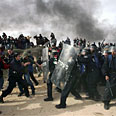Around the time of the battle for Amona, Yesha Council spokespeople said the land in question had been purchased legally, but said the Arab who sold them the land was afraid to sign the papers confirming the sale. Therefore, there was no title deed to prove their ownership of the property.
This claim was good enough for many people, including many who were appalled at the behavior of the rioters. The government's insistence on sticking to the tiny details was taken as cruelty by people who had paid good money for the land and could have gotten the required signature, if only they'd been given some more time.
Similar problems have been encountered by Jews trying to purchase land in Israel, from the very start of the Zionist enterprise until today. Why stick it to the Amona folks?
Purchase by extortion
The truth is, the circumstances under which the Amona land was purchased gives new meaning to the phrase "business transaction": This was an interaction between extortion and extorted, not a proper sale in which two equal partners agree to buy and sell a property of their own free will.
How do I know? Usually settler groups try to conceal their purchase methods, but I was shocked to find the purchase book for Amona open for all to see in the latest edition of the Benjamin Regional Council newsletter.
To be sure, the facts weren't laid out in order to show every one just how the Palestinians are forced to sell their lands, but rather to show the evil ways of the government.
The openness with which the story is told, the innocent and practical tone the writers use to discuss the act of stealing someone's last valuable possession is almost as infuriating as the deed itself.
Credible sale?
Here's how the land was purchased, according to the council newsletter: Residents of Ofra wanted the hill that dominates their community, but the land belonged to residents of the neighboring village.
When Route 60 was paved, they saw their chance and cut off the hill from the Palestinian village.
Village residents who owned the land couldn't get there, and the Mukhtar (Mayor) turned to his Jewish neighbors and asked them to approach the authorities in an attempt to build an underpass under the road.
Ofra residents took advantage of their neighbor's weakness and offered to buy the land. The Mukhtar sent a representative, and a deal was made. But when word got back to the villagers, the representative was beaten mercilessly, and residents refused to sign the sale documents.
This version of events will be cleaned up and will be presented to paint the buyers in a good light, but it is also clear that is no law like the law of transactions between people who can bargain under free-market conditions. It is a deal between servants and masters.
Other examples
Similar shenanigans were used to build East Matityahu, the largest neighborhood in the Modi'in jurisdiction, which was built on land from the nearby Bili'in village, an area which the Supreme Court ruled cannot be populated. There, too, Jewish developers claimed the land had been bought from Arabs who wouldn't dare affirm the sale.
The hand of authority washed the hand of the thieves.
These episodes accurately portray the history of settlements in the occupied territories. Public lands are appropriated for Jewish-only use. Civilian settlements have been built on land ostensibly expropriated for security needs. Various dirty tricks have been used to take land away from absentee owners and give it to Jews.
Arab settlements have been isolated, cut off from their lands, leaving them no choice but to sell their lands to Jews. The lords of the land, the settlers, have gotten open or secret support from malicious governments, Ariel Sharon, and others in the heart of Kadima's lineup.
Now, who knows what the bigger lie is: the government's claim that Amona residents broke the law, or the settlers claim that the land was purchased legally.

















